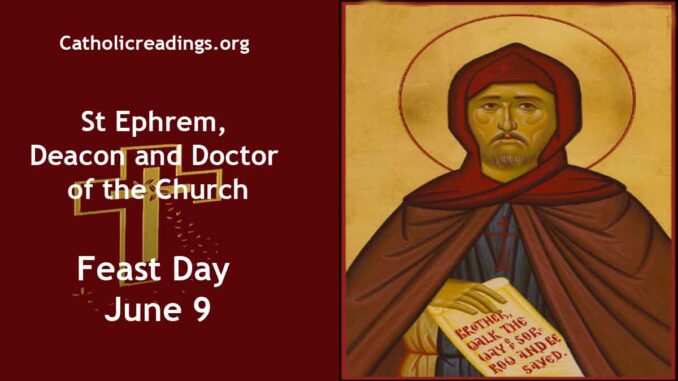St Ephrem of Syria was also known as Ephrem of Edessa, Sun of the Syrians, Aprem of Nisibis, the Syrian, Harp of the Holy Spirit, Ephraim, Ephraem Syrus, Deacon of Edessa or Jefrem Sirin.
He was a Christian theologian and writer born in 306 AD in Nisibis at the border of Syria and Turkiye.
He died on June 9 373 in Edessa, Turkey.
His feast day is celebrated on June 9 every year.
| St Ephrem, Deacon and Doctor Biography | |
|---|---|
 St Ephrem, Deacon and Doctor of the Church – Feast Day – June 9 2026 | |
| Date of Birth | 306 AD |
| Place of Birth | Nisibis at the border of Syria and Turkey |
| Profession | Deacon, Confessor and Doctor of the Church |
| Place of Work | Turkey |
| Date of Death | June 9 373 |
| Place of Death | Edessa, Turkey |
| Feast Day | June 9 |
| Canonization | Pre-Congregation |
| Patron Saint of | Spiritual directors and spiritual leaders |
St Ephrem the Syrian Life History
St Ephrem was born in 306 AD in the city of Nisibis (now Nusaybin) which is near the Syria-Turkey border.
At that time it was in the newly-acquired Roman province of Mesopotamia. His parents were among the Christians in the city.
St Ephrem grew up under the leadership of Bishop Jacob of Nisibis. He was baptized as a youth and afterwards, Bishop Jacob appointed him as a teacher.
After he was ordained as a deacon, he began to write biblical commentaries and compose hymns as part of his educational office.
He often referred to his bishop as the “shepherd”, himself as a “herdsman” and to his community as a ‘fold’.
Ephrem was the founder of the School of Nisibis, which became a centre of learning of the Church of the East in later years.
Roman Emperor Constantine I died in 337 AD. This gave rise to attacks by Shapur II of Persia who in 350 AD attacked Nisibis by rerouting the River Mygdonius to weaken the walls of Nisibis.
The residents of Nisibis managed to repair the walls and while at it, the elephants that the Persian warriors rode got stuck in the wet ground.
St Ephrem saw this as the miraculous salvation of Nisibis and composed a hymn that portrayed the city of Nisibis like Noah’s Ark that safely floated on the flood.
There is an inscription in the baptistery of Nisibis, which was constructed in 359 AD under Bishop Vologeses.
It says that year, Shapur II of Persia attacked again, destroyed the cities around Nisibis, and killed and deported their citizens.
Roman Emperor Flavius Julius Constantius, known as Constantius II, was unable to contain these attacks. But in 363 AD, he died in battle and the army hurriedly replaced him with Jovian as the new emperor.
The tired and hungry army was too weak to battle with the Persians. Consequently, in 363 AD, Jovian was forced to surrender Nisibis to Persia in order to rescue his army. This permitted the expulsion of the entire Christian population from Nisibis.
After the expulsion in 363 AD, St Ephrem finally settled in Edessa. He continued with his Church ministry as a teacher in the School of Edessa.
Edessa had many philosophies and religions which were marred with confusion. This prompted Ephrem to write many hymns defending the Nicene orthodoxy.
On June 9 373, after living for then years in Edessa, St Ephrem died in the plague as he took care of the plague victims. His tomb is in the Armenian monastery in Der Serkis, west of Edessa, Turkey.
St Ephrem wrote over four hundred hymns which are still in existence. Pope Benedict XV proclaimed Ephrem a Doctor of the Church (“Doctor of the Syrians”) on October 5 1920.
St Ephrem Birth
He was born in 306 AD in Nisibis at the border of Syria and Turkey.
St Ephrem Death
On June 9 373 AD, after living for then years in Edessa, St Ephrem died in the plague as he took care of the plague victims.
St Ephrem is the Patron Saint of
- Spiritual directors
- Spiritual leaders
Feast Day
St Ephrem feast day is celebrated on these days by different Christian faiths
- June 9 (Catholic Church, Church of England)
- June 8 (Scottish Episcopal)
- Saturday 7th before Easter (Syriac Orthodox Church)
- January 28 (Eastern Orthodox; Eastern Catholic)
- June 18 (Maronite Church)
- June 10 (Wales; Episcopal Church in the USA)
Representation
In drawings, paintings, and statues, St Ephrem is represented in the forms below
- Vine and scroll
- Man with Saint Basil the Great
- Man with a cross on his brow, pointing upwards
- Man in a cave with a book
- Man composing hymns with a lyre
- Hermit sitting on a column
- Deacon’s vestments and thurible
Today’s Catholic Quote:
Humility is the path that leads to abiding peace and brings us near to the consolations of God.
Related Links
Powered By SEO Experts
Follow @ReadingCatholic
